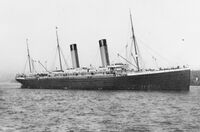TSTS Unity: Difference between revisions
No edit summary |
No edit summary |
||
| Line 69: | Line 69: | ||
}} | }} | ||
|} | |} | ||
The '''Trans-Sivuk Transport Ship Unity''', commonly known as '''TSTS Unity''', was a [[Unification-Class Oceanliner]] steam ocean-liner built in 1910 in the [[Chozko|Chozkian]] shipyards owned by [[Prolotov Ship Lanes]]. It was specifically designed to cater to the needs of immigrants and tourists traveling between the nations of Chozko, [[Shadoveil]], [[Neuewland]], [[Vileria]], and [[Sauthar]], with regular stops at these ports. The TSTS ''Unity'' was a majestic vessel that was considered one of the most significant achievements of Chozkian shipbuilding technology during its time. The name "Unity" was chosen for the ship because it symbolized the unification of the Sivuk Gulf. The ''Unity'' played a vital role in bringing together people from different nations, promoting cultural exchange, and fostering friendly relationships between them. | The '''Trans-Sivuk Transport Ship Unity''', commonly known as '''TSTS Unity''', was a [[Unification-Class Oceanliner|Unification-Class]] steam ocean-liner built in 1910 in the [[Chozko|Chozkian]] shipyards owned by [[Prolotov Ship Lanes]]. It was specifically designed to cater to the needs of immigrants and tourists traveling between the nations of Chozko, [[Shadoveil]], [[Neuewland]], [[Vileria]], and [[Sauthar]], with regular stops at these ports. The TSTS ''Unity'' was a majestic vessel that was considered one of the most significant achievements of Chozkian shipbuilding technology during its time. The name "Unity" was chosen for the ship because it symbolized the unification of the Sivuk Gulf. The ''Unity'' played a vital role in bringing together people from different nations, promoting cultural exchange, and fostering friendly relationships between them. | ||
On June 17th, 1912, tragedy struck when the ''Unity'' sank North of Yurtaland. | On June 17th, 1912, tragedy struck when the ''Unity'' sank North of Yurtaland. | ||
Revision as of 17:00, 1 June 2023
This article is incomplete because it is pending further input from participants, or it is a work-in-progress by one author. Please comment on this article's talk page to share your input, comments and questions. Note: To contribute to this article, you may need to seek help from the author(s) of this page. |
 Unity leaving Port Kalakov in March 1911
| |
| History | |
|---|---|
| Name: | TSTS Unity |
| Owner: | Prolotov Ship Lanes |
| Builder: | TBA |
| Laid down: | March 9th, 1908 |
| Launched: | May 3rd, 1910 |
| Out of service: | June 17th, 1912 |
| Fate: | Sunk North of Yurtaland |
| Notes: | TSTS Unity had sister ship TSTS Harmony |
The Trans-Sivuk Transport Ship Unity, commonly known as TSTS Unity, was a Unification-Class steam ocean-liner built in 1910 in the Chozkian shipyards owned by Prolotov Ship Lanes. It was specifically designed to cater to the needs of immigrants and tourists traveling between the nations of Chozko, Shadoveil, Neuewland, Vileria, and Sauthar, with regular stops at these ports. The TSTS Unity was a majestic vessel that was considered one of the most significant achievements of Chozkian shipbuilding technology during its time. The name "Unity" was chosen for the ship because it symbolized the unification of the Sivuk Gulf. The Unity played a vital role in bringing together people from different nations, promoting cultural exchange, and fostering friendly relationships between them.
On June 17th, 1912, tragedy struck when the Unity sank North of Yurtaland.
Career
Fate
On the fatal day of it's final voyage June 17th, 1912, the weather was foggy and stormy, making for treacherous sailing conditions. The captain knew that the south was too rocky, so he pointed the ship away from the shore. but unfortunately, the ship scraped against the rocks. The impact of the collision was severe, causing a large breach in the hull of the ship. The rough waves of the stormy weather quickly caused water to flood the vessel, and the situation quickly became dire. With the ship taking on water rapidly, the captain was left with no choice but to give the general order to abandon ship. Panic and chaos ensued as passengers and crew members scrambled to find lifeboats and escape the sinking vessel.
Amidst the chaos, the crew members did their best to assist passengers and help them reach the lifeboats. However, with only a limited number of lifeboats available, many passengers were left to fend for themselves in the frigid and turbulent waters. The ship sank in under an hour after colliding with the submerged rocks and out of the 1472 people on board, only 162 survived. The majority of those who perished were a mix of Sivukian, Vilerian, and Sautharian people.
